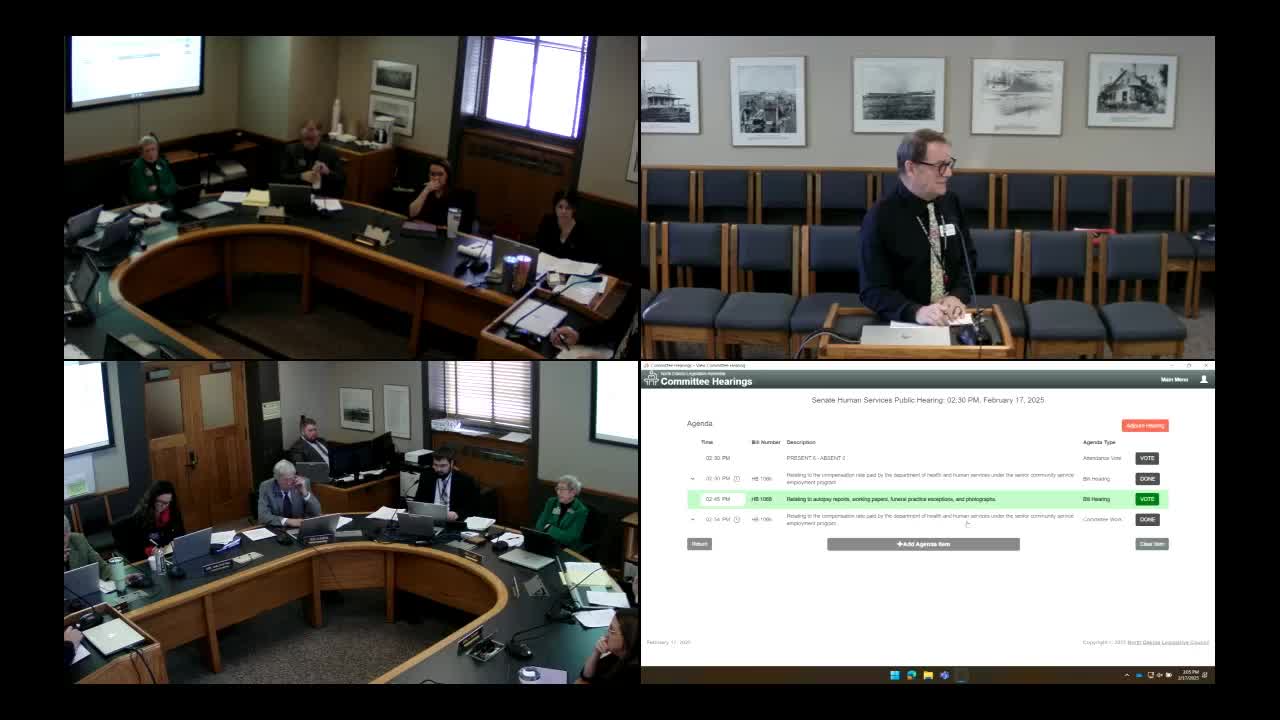Senate committee advances bill to set pay rate for senior training program at $12 an hour
Get AI-powered insights, summaries, and transcripts
Subscribe
Summary
The Senate Human Services Committee voted 6-0 to give a "do pass" recommendation to House Bill 1066, which sets an initial $12 hourly compensation rate for participants in the Senior Community Service Employment Program to increase federal fund use and reduce state administrative costs.
The Senate Human Services Committee on a 6-0 vote recommended passage of House Bill 1066, which would set an initial $12 per hour compensation rate for participants in the Senior Community Service Employment Program, a federally funded training program for low-income residents age 55 and older.
Jim Fleming, interim director of the Vocational Rehabilitation program at the North Dakota Department of Health and Human Services and child support director, told the committee the change is intended to increase program participation and avoid returning federal funds. "We are asking for your permission to spend more money so we can save yet even more money," Fleming said. He said the state receives $7,800,000 a year under the Older Americans Act and that the CSEP allotment is $480,000 per year.
Fleming explained program mechanics and constraints: by federal rule CSEP participants must be paid the applicable minimum wage; because North Dakota’s prevailing entry-level wages approach $20 an hour, the current federal-based floor reduced participation. He said the bill would create a compensation rate limited to CSEP participants and allow the department to adopt a different rate by administrative rule. "We would roll with the $12 an hour for a while to see how that impacts participation," Fleming said.
Committee members asked for operational details. Fleming said the program is authorized for 49 slots statewide but currently averages 20 to 25 participants, and that participation hours vary; the program is administered by three temporary CSEP coordinators who work with nonprofits and local governments to place trainees. Fleming added the program’s allowable administrative cost is capped at 13 percent of total expenditures; increasing paid training could raise the federal-funded portion and reduce the state share of administrative costs.
Several senators questioned whether $12 will be competitive in local labor markets and whether specifying the rate in statute was preferable to setting it by rule. Fleming said the bill provides flexibility: the department could lower the rate by rule if demand outstrips grant dollars. "49 slots times 20 hours at $12 will surpass what we have in grant funds. So we're gonna have to watch supply and demand for the program," he said.
The committee chair called for a motion; a "do pass" recommendation was moved and seconded and the roll call showed unanimous support. The committee recorded a 6-0 favorable recommendation and asked for a volunteer to carry the bill to the floor.
If enacted, the bill would not appropriate additional state dollars according to the department’s revised fiscal note, and the department said the change is intended to increase the use of federal grant funds and reduce the state’s administrative expense burden.
Votes at a glance: House Bill 1066 — Do pass recommendation; committee vote 6-0.
